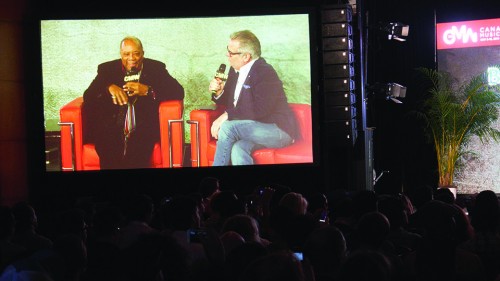The line up of panels at this year’s Canadian Music Week was nothing short of remarkable. However, few presentations were more anticipated than the keynote by the legendary Quincy Jones. Ross Porter, CEO of Jazz FM 91, had the honour and pleasure of interviewing Quincy, who came to the stage amidst a thunderous applause. Quincy began the discussion by talking about his latest discovery, Nikki Yanofsky. The 20-year-old singer and songwriter is probably best known for her rendition of the 2010 Winter Olympic Games Canadian theme song “I Believe”. She recently worked closely with Quincy on her 2013 release, Something New. Quincy had nothing, but praise for Yanofsky, as he reminisced about his first engagement with the young artist. “When I met her she was signing Ella Fitzgerald,” said Quincy, just before breaking out into an imitation skit of the occasion.
Quincy Jones told stories like anyone would who has had a rich and accomplished career. The tales were as poignant as they were witty, and invoked inspiration in just a few short sentences. An apparent difference with Jones was that the subjects of his stories were equally influential individuals like Ray Charles, Marlon Brando and Michael Jackson. He recalled nicknaming MJ smelly, claiming he would often replace taboo words like funky with euphemisms like “smelly jelly”. There was also a moment when the aged legend remembered a time when Marlon Brando gave his son acting lessons. His tone slipped into a reminiscent mumble as he muttered though the small details of the encounters with a warmth that kept the audience members motionless and smiling.
He remembered being stabbed in the hand at age seven for walking through the wrong neighborhood in Chicago and spoke extensively about his time on 52nd street in New York back in the 1950s, a time he described as the most incredible period of his life.
His early life had its highs and lows. He remembered being stabbed in the hand at age seven for walking through the wrong neighborhood in Chicago and spoke extensively about his time on 52nd street in New York back in the 1950s, a time he described as the most incredible period of his life. The legend would smile and chuckle frequently, as he recalled the simplicity of those early days. “I never looked back until I hit 80 (years old),” said Jones. “You can’t plan that kind of stuff. Working with Billie Holiday at 14, Cab Calloway at 15, Ray Charles and I came up together. Then from Louis Armstrong to Ella (Fitzgerald), (Frank) Sinatra, Paul Simon, Michael Jackson, everybody!”
Quincy’s legacy is so deep and far-reaching across the musical landscape; it was sometimes hard to keep up with his constant decade hopping. One moment he would be talking about Miles Davis calling him a “mofo” for trying to play like him, the next he’d be talking about Tupac dying in his daughter’s arms. His references often went over the heads of some of the younger listeners as names like Louis Jordan and Lionel Hampton caused a few attendees to whip out their phones for a quick Wiki search.
If there was one message Quincy wanted the audience to walk away with, it was to be prepared. He made it a point to communicate that the key to his success was to prepare for all eventualities as he so eloquently put it.
Personal struggles weren’t left off the table either, as he spoke candidly about the two aneurysms he suffered that prevented him from playing the trumpet. “They cut my head open twice. They put a metal clip in,” recalled Quincy. “I can’t go through customs or play the horn ever again, but what are the alternatives? I want to stay vertical.”
As difficult as these times sounded for the legend, there was no hint of regret.
The Q and A period was equally engaging. From one audience member taking advantage of having Quincy’s ear prior to belting out a tune, to Canadian rapper/producer Saukrates relating to Quincy’s story of MJ mispronouncing the name Socrates. If there was one message Quincy wanted the audience to walk away with, it was to be prepared. He made it a point to communicate that the key to his success was to prepare for all eventualities as he so eloquently put it. “The only place where success comes before work is in the dictionary.”
To have the opportunity to hear a man with nearly 60 years in the industry talk like his listeners were sitting on a couch next to him was a true rarity and one that will be hard to top by Canadian Music Week in the coming years.
Words By. Sean Watson + Photos By Samantha O’Connor




Comments are closed.